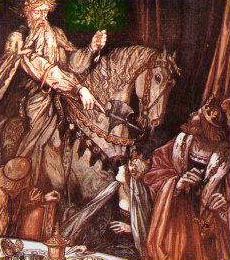Passage Analysis:
First Morning in the Green Castle
Sir Gawain plays a significant role in many Arthurian legends in the Middle Ages. In Sir Gawain and the Green Knight he is the main hero, a warrior, with the concentration on the upcoming battle, rather than a seducing knight. During Gawain's visit to Bercilak's castle, the host's wife makes three advances to seduce Gawain into an adulterous relationship. With all his will power he tries to ignore advances of the Bercilak's wife. Some of the chivalric values, courage, respect for hospitality, honesty, pride,
 nobility and courtly love, help Sir Gawain in his query.
The latter scenes explore the world of men and the appropriate
environment for male chivalric actions. The lord is in the
lead, the courageous and most active of the hunters. The
bedroom scenes show another world of male-female relationship,
where again, the knight proves his noble standing and devotion
to true knighthood.
nobility and courtly love, help Sir Gawain in his query.
The latter scenes explore the world of men and the appropriate
environment for male chivalric actions. The lord is in the
lead, the courageous and most active of the hunters. The
bedroom scenes show another world of male-female relationship,
where again, the knight proves his noble standing and devotion
to true knighthood.
Before the daylight, in the morning, the host and his huntsmen set out after the boar. The poet describes in detail how cheerful the all-day-long hunt is, using a lot of details and images: there are men with "mighty bows," brave knights and their flying arrows, a lot of horns and barking hounds. Many hunters fear for their lives but the lord, the bravest of them all and a true knight, shows the example by leading the chase for the boar because it is his duty to be a shining example to his people. "And many feared for their lives, and fell back a little. But the lord on a lively horse leads the chase." [Norton, 1463-1464]
In the next scene, the poet turns away from the hunting scene to the Sir Gawain's bedroom in the castle, where he peacefully awakens from sleep. It seems that the poet intentionally positions the bedroom scenes within the hunting scenes: the symbolic hunt juxtaposed with the literal hunt. The lady, the host's wife, carefully enters the room. She sits beside him on the bed and he pretends to be surprised at seeing her here. The passage revolves around the host's wife attempts to seduce Sir Gawain, and he tries to avoid the consequences of such thing happening. She is a real temptress, tests his courtesy, virtue, decency, and a real object of courtly love, but he acts in accord with court's rules of love. "I am yours to command, to kiss when you please; You may lay on as you like, and leave off at will." [Norton, 1501-1502]. As the persuasion becomes more and more aggressive, she starts using compliments and blames him for neglecting her feelings. "And you are the noblest knight known in your time; No household under heaven but has heard of you fame... Yet never has a fair phrase fallen from your lips of the language of love, not one little word!" [Norton, 1520-1524]
She is angry because other knights try to make their ladies happy, but he is, on the contrary, cold to her and never talks to her of the language of love, "not one little word." That makes her wonder if he is ignorant about love and whether he likes her at all. "How! Are you artless, whom all men praise? Or do you doom me so dull, or deaf to such words?" [Norton, 1528-1529] At the end of the passage, she continues to flirt with him very actively, pointing out that her husband is away on the hunt and the entire castle is asleep.
Sir Gawain and the Green Knight is a tale of romance, irony and courtesy, that portrays the image of courtly relationships in a clear way. The lady is testing Gawain's morals by challenging his duty as a courteous knight to do as lady wishes. By admitting, in a polite and tactful manner, that she is a better person than he is and that he is not worthy of her affection, humble and courteous Sir Gawain is able to retain his honor.
